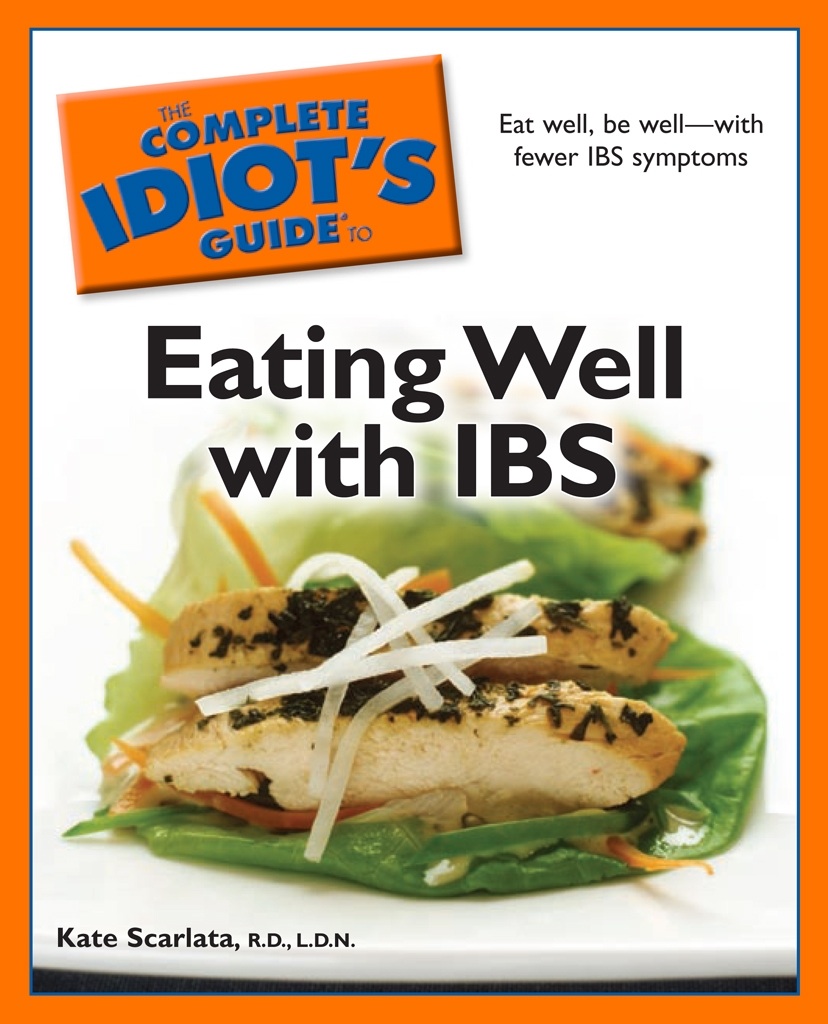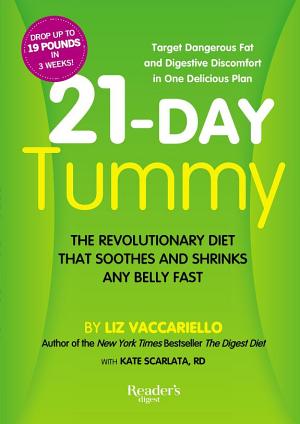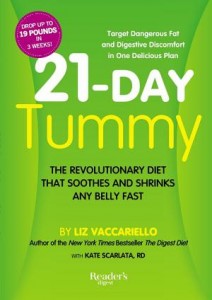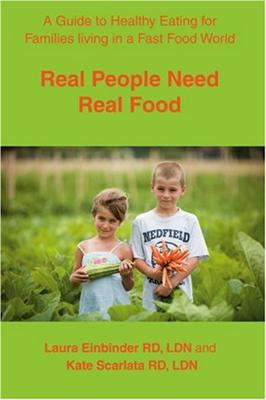I had no idea when I became a registered dietitian that I would do a fair amount of health writing in my career…..but I have been fortunate to be involved in some great writing projects! Here are a few of my books I would like to share with you…
Here’s my latest book, just published December 2013!
My latest work is a book I authored with Liz Vaccariello, editor-in-chief and chief content officer of Reader’s Digest called 21 Day Tummy. The 21 Day Tummy Plan is designed for the person who desires weight loss but ALSO suffers from common digestive symptoms such as gas, bloating, diarrhea, constipation or reflux. Liz and I included ground breaking science-particularly in the area of gut bacterial imbalance and the impact on the human body- and included more than 50 delicious tummy taming recipes (all reduced in FODMAPs) and full of real foods–from a plant not made in a plant!
We tried the 21 day plan on 12 testers and everyone lost weight and experienced improvement in their digestive symptoms. Two of the testers went off long term PPIs (heartburn medications). The book incorporates the low FODMAP diet and boosts nutrients associated with anti-inflammation or GI benefit: turmeric, ginger, monounsaturated fats, low FODMAP fiber, and is calorie controlled and emphasizes our daily needs of magnesium, a nutrient 69% of Americans are deficient in. Does a low FODMAPs help people lose weight? Perhaps. Alterations in gut flora play a role in how we extract calories from our food, enhance inflammation, alter how our intestine moves… BUT the low FODMAP part of the diet in the 21 Day Tummy was added to help manage bloating, gas and common irritable bowel syndrome (IBS) symptoms. IBS is estimated to impact 1 in 5 Americans! And is a growing problem in many Westernized countries. Readers are instructed to be screened for celiac disease (blood test) and are also clearly instructed that removing FODMAPs is not encouraged for the long term (FODMAPs are innately healthy foods) and are walked through the challenge phase of the low FODMAP diet to find out what foods are their potential triggers.
Buy the Complete Idiot’s Guide book!

Here is my latest book, The Complete Idiot’s Guide to Eating Well with IBS alpha, 2010. This book is my introduction to IBS including the new FODMAPs approach which has helped so many of my clients feel so much better. Yah!
Buy the book!
I coauthored this book in 2008. Real People Need Real Food contains all the essentials to feeding your family right including: label reading, grocery shopping, mindful eating, exercise, and of course, lots of great family-friendly recipes!




Michael
My favorite children’s book of all-time is “Curious George Goes To The Hospital”. My mom got it for me when I had to stay over in the hospital and it has always stayed with me! Love the blog Kate! Thanks for all the help and support!
katescarlata
I love Curious George books too!
liz
Hello!
I know the low FODMAP diet has been updated recently. Is there a place I can stayup on up to date FODMAP friendly foods?
Also-is there a forum for questions?
I have had much success with this diet and want to stay on track but on the internet there is so much conflicted information about what is ok/not ok to eat.
Thanks!!!
katescarlata
Hi Liz- glad you reached out. There is much misinformation about the FODMAPs approach online. The majority of research is out of Monash University in Australia. I update my site based on info. from their research. Sue Shepard has a site with great info. too. Unlike gluten in Celiac disease which is toxic to the intestines FODMAPs are not toxic but can have a cumulative impact on symptoms- so small amounts may be tolerated. I will be attending a workshop at Monash University next month so will be posting lots of updates- stay tuned!
Amy
Hi Kate,
I’ve struggled with IBS my whole life, and am ready to try the FODMAPs approach. I’ve had hydrogen breath tests for lactose & fructose & glucose (SBBO). Negative for lactose & glucose, positive for fructose. There seems to be some conflicting information between FODMAP & fructose intolerant diets – will FODMAP completely take my fructose intolerance into account? Things like carrots, sweet potatoes & especially tomatoes seem to be banned or severely limited in fructose-free diets, but not so much in FODMAPS. Which should I follow? Worried I would be far too restricted if I followed both to the letter.
Thanks!
Amy
katescarlata
Not sure how to direct you Amy since I don’t know you full medical history, however, my patients with FM do very well with the low FODMAP diet. We all malabsorb fructans and GOS so they will have an additive impact on FM so I believe they should be avoided with FM. Since you don’ t have lactose malabsorption that would need not be restricted. Sweet potato should be limited to 1/2 cup but tomatoes and carrots in typical serving sizes should be tolerated. Table sugar, sucrose is well-absorbed with FM but there seems to be a threshold for how much each individual can tolerate–so keep sweets to a minimum, as well, as table sugar contains both glucose AND fructose.
Amy
Thank you! Just bought the idiot’s guide on iPad, so looking fwd to reading it. Also ordered the FODMAP diet book from Australia. What would be a good threshold to start with for a total amount of sucrose I can tolerant in a sitting, or a day?
Also, I noticed I’ll be substituting rice for wheat in order to do the FODMAP – is too much rice also something I need to be concerned with? (i.e. too much starch?)
katescarlata
Sucrose tolerance has not been studied in the IBS population but I would limit to 6 teaspoons per day –per American Heart Association guidelines for women and allow up to 2 teaspoon (tsp) per serving as a conservative baseline. Each tsp of sucrose (table sugar) has 4 grams of sugar.
Amy
Thanks again! Started reading the IBS book for idiots :). Are all the recipes in the book within the guidines of the FODMAP diet or do you have a list of the ones that are?
Jack
Hi Kate –
Love the diet. My wife has seen real progress, but all my info is pieced together from various websites and lists (some slightly contradictory). Is there one book you can recommend for FODMAP. I found one in Australia but that seems a bit far away from us in the States. Thanks so much – Jack
katescarlata
Jack, I recommend Patsy Catsos’ book which is awesome on ibsfree.net and also the Monash U app is FABULOUS if you have an iPhone or iPad. I love having the FODMAP diet at my fingertips!!
Edviga
Looking forward to reading your book. I thank you for your blog, recipes and brand name product recommendations. Having tested positive as a Fructose Malabsorber I have been on a low FODMAP diet for six weeks. It was confusing at first but once I got the portion concept it made sense.
Since starting the diet I have had a remarkable change not only in my gut but also in improved sleep, thought clarity and energy levels. I’ve even had my daily tinnitus completely disappear! It is so amazing; I wonder if others have also experienced similar improvements in their overall health.
Cat
Thank you so much for the website and excellent info.
My first week was hard, next 2 weeks were great, the past 21/2 weeks I have been feverish, IBS pain…not like the old pain though…, canker sores under tongue, constipation, headaches, very weak…have lost 5 pounds…and for once in my life am not trying to do so…am sensitive to many foods that are permitted on FODMAP–live in remote area and difficult to find proper foods–eat mostly blue berries, 1/2 c. pulp OJ, acorn squash, winter squash, rice, spinach, baby carrots(veggies are steamed, baked chicken breast, sweet potatoes or yams, eggs, the permitted cheeses, lactose free milk, organic maple syrup, 2 T. organic 1/2 and 1/2 in coffee (only 1 or 1 1/2 cups of coffee),
butter–the soft kind
Olive oil and brown rice and raw sugar and almond milk were tried but caused distress
I am working with dietitian, but we are a little stumped…Any suggestions? I eat no canned or prepared foods, cannot have seafood or red meat..Was this too long? Sorry…but, I am trying to hang in here.
I have the book, but I am just too tired and cannot find many ingredients to do anything but basic cooking.
C.
katescarlata
Cat–Have you been evaluated for small intestinal bacterial overgrowth? And have you been screened for celiac disease? These 2 tests I would encourage given your history. Is your water supply well water? Has that been tested for contaminants or bacteria/parasites?
We don’t know about the FODMAP content of many of the winter squashes so I might hold off on them or reduce portion sizes. Root veggies such as rutabaga, turnip and parsnips are low FODMAP. Sweet potatoes do have some FODMAPs so be sure to limit to 1/2 cup or small 1/2 of one. Other considerations –are you meals balanced with some healthy fat, protein, low FODMAP veggies or fruits and carbs w/ fiber such as potato with skin, quinoa, root veggies, oats at each meal–to ensure a stable blood sugar. Are you hydrating adequately. Work with your dietitian to ensure you are eating enough calories, vitamins and minerals–and low FODMAP fiber. Hope that helps.
jshep70
Hi, I’ve been trying to figure out if sugar free instant carnation breakfast is low FM? One of the first ingredients is inulin. I saw somewhere, I think in Sue Shepherds book, to avoid it. So I was wondering if you think carnation instant breakfast should be avoided. I make mine with almond milk.
Well Balanced - Food - Life - Travel
Yes, you would want to avoid the sugar free carnation instant breakfast due to the added inulin –which is a FODMAP–but it is also a source of lactose. Almond milk may have FODMAPs too ==would encourage trying a suitable rice, coconut mil or lactose free cow’s milk such as lactaid.